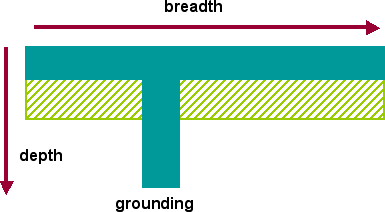This is for the March bulletin so I'm thinking again of March
1st, St David's Day ... and if you don't know your patron saints
let me remind you ... David was the child of a rape by a local warlord,
who became Celtic monk, archbishop and eventually patron saint of
Wales.
In Wales every school has an Eisteddfod on Saint David's Day:
singing, dancing, plays, music and poetry.
The Eisteddfod is at the heart of the Welsh culture, although
itself largely a Victorian re-invention of an older practice. I
recall as a child competing in the Urdd (youth) Eisteddfod and last
year I was fortunate enough to see my own daughters' choir win in
the International Music Eisteddfod (the Welsh approach to music
is rather like the ACM approach to computing: the rest of the world
is ranked in a single lumpen).
At the heart of the Welsh National Eisteddfod is the chairing
of the bard - the word eisteddfod comes from "eistedd" - to seat.
The bard is the master poet, the wordsmith, forming images from
sound, playing the listener with language.
And in each school the houses compete with one other, yet try
to include each child in some event, moving each to mastery.
Some years ago, not long after I had passed the driving test myself
(not until I was 27!), I was driving with a friend. She was soon
to take her test and I was sitting with her while she practiced.
One of the maneuvers in the test is to reverse around a corner
into a road. This was the thing she most dreaded and her tension
was clear as she pulled up beside a street and started to drive
carefully backwards, trying to remember in the right order the instructions
she had been given: "turn the wheel a little to the left, when the
kerb is in the bottom corner of the rear window then turn ..."
She finished and the car was reasonably straight and not too far
from the kerb. She sighed with relief and I looked backwards down
the road. It was a dead end, that's why we had chosen it; one of
those suburban cul-de-sacs with a small turning circle at the end.
There were no cars parked; it was clear all the way down.
"Try driving backwards" I said "play with the wheel, see what
the car does. Don't tell me whether you mean to go straight or swing
about."
She did it and the car wiggled its way slowly backwards down the
road. She stopped. And the look, the shine, the confidence in her
face. It is beyond words. Trepidation turned to triumph. She had
driven backwards, not by rote, but by herself. Mastery.
Since then I have analysed the reasons for this, the play, the
purposefulness too, the deliberate removal of external judgment
but enabling of internal judgment, the shift from correct performance
to exploration. There are techniques we can learn to help students
grow.
In my own teaching I have a thing I aim for, but do not always
achieve. I call it the T model of teaching.
When teaching one is constantly faced with a trade-off between
depth and breadth of coverage. The solution is often to decide on
the breadth that one feels is necessary (perhaps driven by external
curriculum factors), then deal with everything to the maximum depth
possible given this. This uniform model is hatched in the picture.
Typically students lose track of the material about 2/3 way through
any course (so perhaps all curricula ought to be 30% less broad?).
The end result is that students may pass exams, but they feel "I'm
no good at subject X".

In the T model one still deals with the whole breadth of material,
but in overview - knowing what is there, and why it is important,
but not in any theoretical or practical depth. This is a sort of
road map of the subject area.
In addition, however, one chooses some part of the material, no
matter how small, and delves to the very depths, grounding the material
theoretically and in real examples. (Solid area in the picture.)
By grounding, the students gain mastery, and from mastery comes
confidence.
In the future, when faced with the need for knowledge they know
what techniques or information are available because of the broad
overview. However, they also feel "I can do this subject" because
of the mastery they gained. Knowing that they have been able to
master one part of the subject they can go on to learn, when needed,
the extra areas required for their purpose.
In the past I have written about the destructive nature of many
of our failure-centric education systems, often stemming from fundamentally
flawed educational values. In this and the January column I've been
looking more towards the opposite. Let's strive to teach in ways
that enable students to discover and nurture their strengths and
that give them the confidence, control and humility that comes with
true mastery.
 Alan
Dix > HCI Education
Alan
Dix > HCI Education